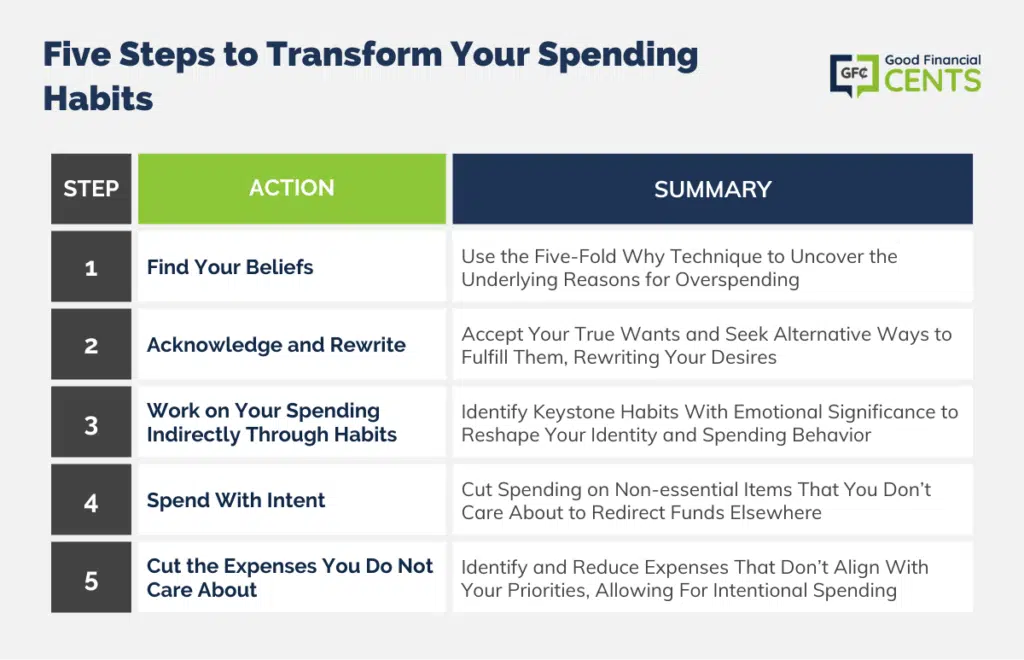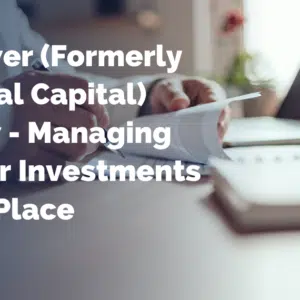This is a guest post from Alex Craig of HaveaRichMarriage.com.
Hello. I’m Alex, and I am a recovering spendaholic.
I am not ashamed to admit that. Spending money felt great, I felt stylish when I bought new clothes, I felt like James Bond when I would rent Corvettes for the day, and I felt like the world owed me something.
I knew I had a problem. I wanted to stop spending so much money, but every time I tried to stop spending or keep a budget, I would stick with it for two weeks and then go on a binge-spending spree.
I had all of the motivation in the world to stop spending because my bank account was getting lower, and my credit card balances were getting higher. I knew I was screwing up financially and would be in trouble soon if something did not change.
I felt powerless and like a failure because it seemed like spending less money should be easy, and I should know what to do.
Six months ago, everything changed for me. I woke up and started spending less money, all without creating some complicated budget and focusing too hard on my spending.
In my efforts to stop spending more money, I learned two things:
1. Information alone is not enough.
2. Sometimes, you may need to change a different behavior in order to change the one you really want.
I am going to share with you five strategies that I used to start spending less.
You can take these strategies and apply them to your spending habits and adapt them to other habits.
I promise you, these strategies work.
They work really, really well.
Table of Contents
Your Mind Is Holding You Back
Money is like sports. It takes a little bit of skill, but it is mostly a mind game.
It takes determination, a positive attitude, and a commitment to win the money game.
A lot of people think the reason many of us live paycheck to paycheck is because of a poor financial education.
True. All of us likely did not get any sort of personal finance training, but most of us know what we should be doing, but most of us do not do it. Why?
For example, all of us know we should spend less than we make if we want to save money. All of us also know we should burn more calories than we consume if we want to lose weight.
This single piece of information is more than enough to save money and lose weight. The problem is not that we don’t have enough information, the problem is our beliefs and mindsets about money.
For example, when I was spending too much money, I was buying clothes and cars that brought me status. My status was so important to me that I was willing to go broke.
It was not the fact that I did not know I should spend less or even how to spend less, it was a status and insecurity issue.
Until you find out why you are spending too much money, spending less will be like pushing a boulder up a hill – possible, but a lot of work.
Here’s how to win the money game…
Step 1: Find Your Beliefs
It starts with asking yourself a series of questions that go deeper and deeper to discover the true meaning of why you are overspending your money.
The technique that works is the Five-Fold Why, which is asking yourself, “Why?” until you have discovered the deeper meaning.
To apply the technique, find an area in your spending that you feel guilty about or think you should cut back. This is the area where you know you are overspending.
If you do not feel like you are overspending in an area, then do some research to see if you are overspending or ask yourself if you need to spend $600 per month at restaurants.
Once you find the area, ask yourself, “Why?” as many times as you can until you get to the root of the spending want.
For example, when I was overspending on clothes, it went something like this…
“Why am I spending so much on clothes when I have plenty in my closet?”
“Because I want to look good.”
“Why do I want to look good?”
“Because I like when people tell me I look nice.”
Now, I am getting somewhere. I can see that it is no longer about spending money on clothes but spending money because I want people to compliment me.
Once we know the true why, we can begin using it to stop our spending.
Step 2: Acknowledge and Rewrite
If we can discover the real wants behind our spending habits, then we can discover new ways to get our wants.
The first part is acknowledging what our true wants are. Do not feel guilty or ashamed about this. Guilt is a powerful de-motivator. Accept your wants and work to solve your wants in another fashion or rewrite your wants.
For example, I learned that my overspending on clothes was because I wanted to receive compliments. Armed with this knowledge, I found different ways to get compliments from others and myself.
Rather than buying new clothes, I would change my hairstyle or facial hair style frequently to get compliments. People always mentioned they liked my beard or me being clean-shaven.
The other thing I did is a little bit embarrassing, and I thought about leaving it out, but then I felt like I would be doing you a disservice, so I am going to share something I have not told anyone before.
Every day, I would look into the mirror and compliment myself. I would pick one good thing, either internal or external, and compliment myself. I know. It seems kind of lame.
But it was one of the best things I could have done because I noticed as I felt more confident, I stopped trying to cover myself with new clothes.
This technique was a lot more effective than focusing on not spending money because the desire to spend money decreased.
Step 3: Work on Your Spending Indirectly Through Habits
Ever notice how when one bad thing happens, more bad things happen?
Some habits work the same way. When we form a certain good habit, other habits will naturally form without any effort.
For example, if you work out, you tend to eat better. If you wake up early, you tend to be more productive. When you form a certain habit, your brain will begin to redefine your identity.
If you are working out more, you will tell yourself, “I work out. I am not the type of person who eats junk food.”
Charles Duhigg refers to these habits as Keystone Habits. They are habits that, if implemented, will create a ripple effect throughout your entire life.
Eight months ago, I was trying to form the habit of waking up early. For the past two years, I had formed terrible sleeping habits, which caused unproductivity and overspending.
When I finally started waking up early, my spending went down. I noticed I would tell myself, “I am not the type of person who goes out every night to spend money because I have to be to bed early.”
Instead of trying to form a new money habit, find a habit that will create a ripple effect throughout your life.
Find a “Keystone” Habit
To find your keystone habit, you could have more than one, you need to find a habit that is highly emotional to you. It can be happy that you feel constant guilt about it, or it is embarrassingly scary.
For example, I beat myself up all the time over not being able to wake up early, and I was ashamed to admit that I would sleep in until 10 a.m. or later every day.
For you, it could be working out. You might be scared to go to the gym or embarrassed.
Once you find the habit, you can begin working on the habit.
Form That Keystone Habit
I will not spend too much time talking about forming habits because Charles Duhigg does a good job of that.
I will briefly talk about the three components that go into forming any habit – cue, behavior, and reward.
To form a new behavior, like waking up early, you have to implement a trigger that would tell your brain it is time to go to bed early. If the behavior was performed, then you would reward yourself with something you really like.
Do that enough times, and the habit eventually forms. If you form a keystone habit, it will likely ripple through to your finances.
Step 4: Spend With Intent
This is the only strategy where you will have to put a little focus on your spending, but it should not be much.
The idea of this strategy is to cut your spending on the things you do not care about. It will not make you feel like you are cutting your spending because you likely will not miss it.
For example, I liked spending money on clothes, but I also spent a lot of money on going out to eat. I did not care about going out to eat and did not enjoy it half the time, so in order to be able to spend some more money on clothes, I cut going out to eat.
You could also cut an expense category like credit card payments. Surf your balance to a 0 balance transfer card and get those payments out of your life faster.
Step 5: Cut the Expenses You Do Not Care About
Find expenses that you do not care about. It could be your insurance, your mortgage, the coffee you get before work every day, or something else.
Find a way to lower that expense. This site offers plenty of solutions on how to cut your insurance or other expenses.
With the money that you save, you might be able to afford the things you love spending money on and still have money left over.
The goal is not to stop your spending but to be intentional with your spending.

Takeaways
Sometimes, information alone is not enough. The problem might be deeper than being uninformed and more of a problem with your beliefs and views.
Sometimes, the best way to change a problem is to change a different problem because it might create a ripple effect and solve your other problems.
If you find that controlling the money you spend is difficult, then these five strategies might be great for you.
Alex Craig wants to help you find your first profitable idea. Check out his Side Hustle List here.








Wow this really worked for me, thanks….
One thing I follow while shopping is to have the list of items that I need to buy and be strict on what I buy, it really helps me in keep calm and stay away from distractions.
Hi Alex,
Just discovered your site. Loved the post! I especially like your suggestion to spend with intent. I am learning to do more intentional spending and less frivolous spending.
Thanks,
Laura Beth
Hey Natalie,
That is a good point. I think Leo of Zen Habits has the same philosophy.
He believes it is much easier to form a new habit, then changing one. So in this example, it is easier to work on saving, then to stop spending.
These are really valuable tips. Personally, I like to start new, supportive habits instead of trying to remove bad habits. So, instead of focusing on spending less, I focus on saving more. This mindset, in addition to planning expenses on a budget, have been the key to my success.
Hi – just a small question about one of the details in this post… How did you get your wifi to turn off at 930pm every night? (I could use help with my bedtime routine too!)
You have to go into your Router and create a web filter. All routers are different as far as the specific set-up, but here is a general article that might be a good place to start:
http://www.howtogeek.com/168379/10-useful-options-you-can-configure-in-your-routers-web-interface/
Near the bottom it talks about website blocking and such. Not all routers have this ability, but those that were made in recent times do.
Alex